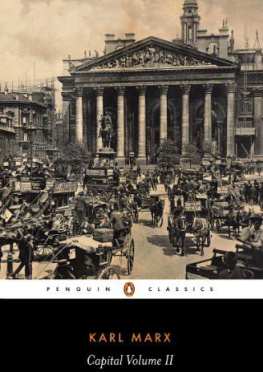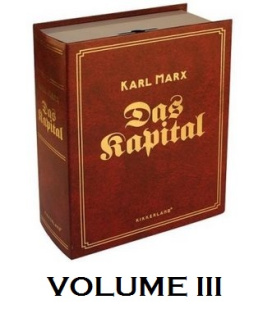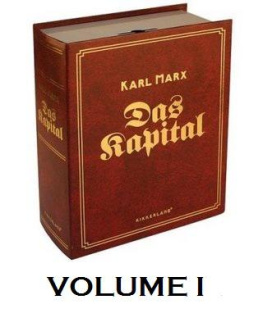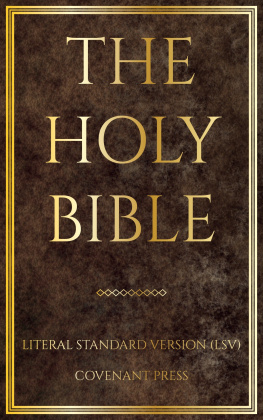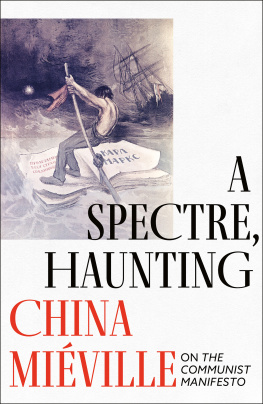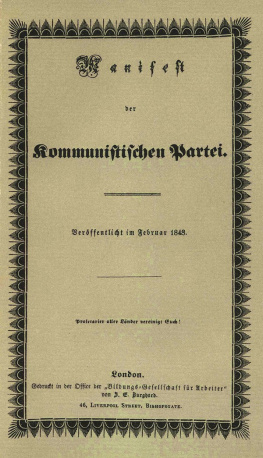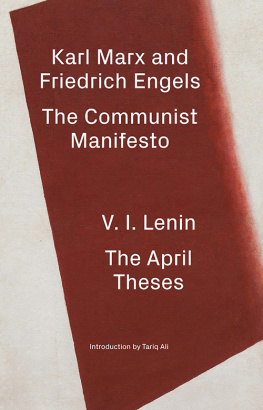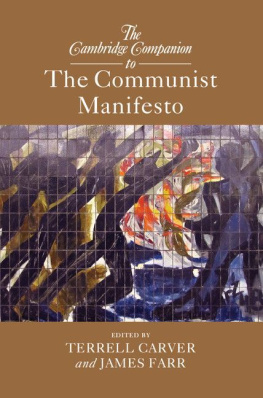The Communist Manifesto
In Plain and Simple English
BookCaps Study Guides
www.bookcaps.com
2012. All Rights Reserved.
Table of Contents
About BookCaps
To see other books in the Plain and Simple English series, visit www.BookCaps.com .
Comparative Version
Introduction
An invisible demon is haunting Europe -- the demon of Communism. All the Powers of old Europe have formed an alliance to chase out this demon: Pope and Czar, Metternich and Guizot, French Radicals and German police-spies.
A spectre is haunting Europe -- the spectre of Communism. All the Powers of old Europe have entered into a holy alliance to exorcise this spectre: Pope and Czar, Metternich and Guizot, French Radicals and German police-spies.
Where is the underdog political party that has not been labeled Communistic by its rivals in power? Where the Opposition that has not thrown back the name-calling of Communism, against its own competitors?
Where is the party in opposition that has not been decried as Communistic by its opponents in power? Where the Opposition that has not hurled back the branding reproach of Communism, against the more advanced opposition parties, as well as against its reactionary adversaries?
Two things happen as a result.
Two things result from this fact.
I. Communism is already treated and realized by all European Powers as itself a Power.
I. Communism is already acknowledged by all European Powers to be itself a Power.
II. It is time that Communists should openly, in front of the whole world, publish their views, their aims, their tendencies, and meet this fairytale of the Demon of Communism with a Manifesto (a statement of beliefs and goals) of the party itself.
II. It is high time that Communists should openly, in the face of the whole world, publish their views, their aims, their tendencies, and meet this nursery tale of the Spectre of Communism with a Manifesto of the party itself.
To this end, Communists of various nationalities have assembled in London, and made a draft of the following Manifesto, to be published in the English, French, German, Italian, Flemish and Danish languages.
To this end, Communists of various nationalities have assembled in London, and sketched the following Manifesto, to be published in the English, French, German, Italian, Flemish and Danish languages.
I. Bourgeois and Proletarians
The history of societies up until now is the history of struggles between social classes.
The history of all hitherto existing societies is the history of class struggles.
Free man and slave, patrician and plebeian, lord and serf, guild-master and journeyman, in a word: oppressor and oppressed, stood in constant fighting against each another, carried on an uninterrupted, sometimes hidden, sometimes open fight - a fight that each time ended either in a revolutionary reorganization of society in general, or in everyone losing.
Freeman and slave, patrician and plebeian, lord and serf, guild-master and journeyman, in a word, oppressor and oppressed, stood in constant opposition to one another, carried on an uninterrupted, now hidden, now open fight, a fight that each time ended, either in a revolutionary re-constitution of society at large, or in the common ruin of the contending classes.
In the earlier periods of history, we find almost everywhere a complicated arrangement of society into several sections, all sorts of divisions in wealth and power. In ancient Rome we have patricians, knights, plebeians, slaves; in the Middle Ages, feudal lords, vassals, guild-masters, journeymen, apprentices, serfs; in almost all of these classes, again, even more specific categories.
In the earlier epochs of history, we find almost everywhere a complicated arrangement of society into various orders, a manifold gradation of social rank. In ancient Rome we have patricians, knights, plebeians, slaves; in the Middle Ages, feudal lords, vassals, guild-masters, journeymen, apprentices, serfs; in almost all of these classes, again, subordinate gradations.
The modern bourgeois society that has grown out of the ruins of feudal society has not gotten rid of class rivalry. It has simply established new classes, new conditions of oppression, new forms of struggle in place of the old ones. Our time period, the epoch of the bourgeoisie, has, however, this distinctive feature: it has simplified the class enemies. Society as a whole is more and more splitting up into two huge hostile camps, into two great classes, directly facing each other: Bourgeoisie and Proletariat.
The modern bourgeois society that has sprouted from the ruins of feudal society has not done away with class antagonisms. It has but established new classes, new conditions of oppression, new forms of struggle in place of the old ones. Our epoch, the epoch of the bourgeoisie, possesses, however, this distinctive feature: it has simplified the class antagonisms: Society as a whole is more and more splitting up into two great hostile camps, into two great classes, directly facing each other: Bourgeoisie and Proletariat.
From the peasants of the Middle Ages came the contract workers of the earliest towns. From these towns the first elements of the bourgeoisie were developed.
From the serfs of the Middle Ages sprang the chartered burghers of the earliest towns. From these burgesses the first elements of the bourgeoisie were developed.
The discovery of America and the first sailing around the Cape opened up fresh ground for the rising bourgeoisie. The East-Indian and Chinese markets, the colonization of America, trade with the colonies, the increase in the ways to go about exchanging goods and services, and in goods in general, gave to commerce, to navigation, to industry, an impulse never before known, and thereby, to the revolutionary element in the tottering feudal society, a rapid development.
The discovery of America, the rounding of the Cape, opened up fresh ground for the rising bourgeoisie. The East-Indian and Chinese markets, the colonisation of America, trade with the colonies, the increase in the means of exchange and in commodities generally, gave to commerce, to navigation, to industry, an impulse never before known, and thereby, to the revolutionary element in the tottering feudal society, a rapid development.
The medieval system of industry, under which industrial production was monopolized by closed guilds, now no longer sufficed for the growing wants of the new markets. The manufacturing system took its place. The guild-masters were pushed on one side by the manufacturing middle class; division of labour between the different corporate guilds vanished when faced with division of labour in each single workshop.
The feudal system of industry, under which industrial production was monopolised by closed guilds, now no longer sufficed for the growing wants of the new markets. The manufacturing system took its place. The guild-masters were pushed on one side by the manufacturing middle class; division of labour between the different corporate guilds vanished in the face of division of labour in each single workshop.
Meanwhile the markets kept growing, the demand always rising. Even the assembly line was no longer enough. As a result, steam and machinery revolutionized industrial production. The place of manufacture was taken by the giant, Modern Industry, the place of the industrial middle class, by industrial millionaires, the leaders of whole industrial armies, the modern bourgeois.
Meantime the markets kept ever growing, the demand ever rising. Even manufacture no longer sufficed. Thereupon, steam and machinery revolutionised industrial production. The place of manufacture was taken by the giant, Modern Industry, the place of the industrial middle class, by industrial millionaires, the leaders of whole industrial armies, the modern bourgeois.
Next page


